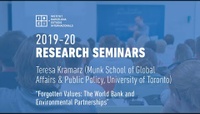Research Webinar. Forgotten Values: The World Bank and Environmental Partnerships
Teresa Kramarz (Munk School of Global Affairs & Public Policy, University of Toronto)
Discussant: Oscar Widerberg (Vrije Universiteit Amsterdam)
Moderator: Charles Roger (IBEI)
Research webinar available in video:
In this talk, based on her forthcoming book, Professor Teresa Kramarz examines the conflict between values and bureaucracy in World Bank biodiversity partnerships. Multi-stakeholder partnerships have become increasingly common and are often promoted as the "gold standard" of good governance—participatory, innovative, and well-funded. And yet these partnerships often fail to live up to the values that motivated them. In her book, Professor Kramarz examines this gap between promise and performance by analyzing partnerships in biodiversity conservation initiatives launched by the World Bank. She reviews World Bank biodiversity partnerships over a twenty-year period, with in-depth studies of two: the Critical Ecosystem Partnership Fund and the Global Invasive Species Program. She finds that partnerships fall short when established in the shadow of a large, mature bureaucracy. Bureaucrats have trouble relinquishing control, and they distrust partners who do not abide by set policies and procedures. The potential contribution of partnerships to biodiversity conservation succumbs to the goals of bureaucratic efficiency. Kramarz develops a theoretical framework to explain the gap between values and practice, combining rationalist and constructivist approaches. Viewing World Bank biodiversity partnerships through this theoretical lens, she shows how the World Bank's risk aversion, hierarchy, focus on rules and procedures, and division of labor have a significant influence in partnership outcomes.
Teresa Kramarz is the Director of Munk One, a program for first year undergraduate students at the Munk School of Global Affairs and Public Policy, and Co-Director of the Environmental Governance Lab alongside Matthew Hoffmann and Steven Bernstein. An expert on international organizations and global governance, with emphasis on global environmental politics, her work has examined the impact of the World Bank’s public-private partnerships on democracy, innovation, and financially sustainable conservation governance, the legitimacy of the World Bank as a global knowledge actor, and the local/global relationship in the provision of global public goods. She has current and upcoming publications with Review of Policy Research, Global Environmental Politics, Springer, Oxford University Press, and the Institute on Globalization and the Human Condition. Dr. Kramarz has extensive experience in her field having worked for almost ten years with the World Bank, the United Nations Development Programme, the Food and Agricultural Organization, and the Canadian International Development Agency on sustainable development programs, institutional analysis and capacity building for the biodiversity, climate change and decertification conventions.

